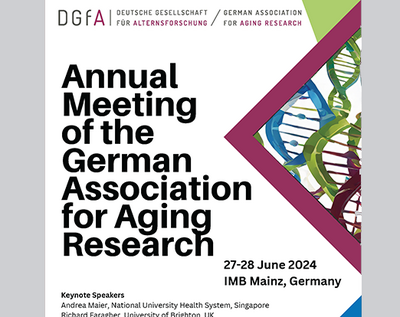Therapies for the diseases of ageing must start with understanding ageing itself
The German Society for Aging Research (DGfA) is organizing its annual meeting this year in Mainz, in collaboration with the Institute of Molecular Biology (IMB), the Leibniz Institute for Research on Resilience (LIR), Johannes Gutenberg University (JGU) and its Mainz University Medical Center (UMC). At the annual meeting, the latest findings in ageing research from the fields of natural sciences and medicine will be presented and discussed.
Old age is often associated with illness. More than half of people over the age of 65 suffer from multimorbidity, i.e. two or more diseases at the same time. Age-related illnesses tie up enormous social and financial resources. It is therefore essential for the future of our society to sustainably reduce the incidence of age-related illnesses and thus enable healthy ageing and societal participation.
Healthy ageing is an enormous scientific challenge. The DGfA Annual Meeting provides an excellent forum to tackle this challenge and address the following priorities:
The common cause of age-related diseases lies primarily in the ageing process itself. Preventive treatments must therefore address ageing itself in order to enable healthy ageing.
Biomedical ageing research is therefore a prerequisite for understanding age-related diseases and enabling healthy ageing.
Lifestyle and nutrition can significantly improve health in old age and delay age-related diseases - and they are still effective in old age. A healthier lifestyle can have an enormous effect on health in old age.
Modern ageing research has now discovered pharmacological interventions that can direct and thus delay the ageing process.
Various interventions and types of therapy must work together to maintain long-term health in old age.
Rapid advances in ageing research give rise to the hope that age-related diseases can indeed be prevented and healthy ageing can succeed. In order to meet this challenge, significantly higher investment in new and existing facilities and instruments for ageing research is essential.
The DGfA is committed to promoting ageing research in Germany and in German-speaking countries. The DGfA sees itself as an interdisciplinary body and brings together basic researchers and clinical researchers in the field of ageing research.
Further details
Prof. Dr. Hartmut Geiger, University of Ulm, President of the DGfA, Hartmut.Geiger@uni-ulm.de
Prof. Dr. Helen Morrison, FLI and University of Jena, Treasurer of the DGfA, Helen.Morrison@leibniz-fli.de
Prof. Dr. Christof Niehrs, IMB Mainz, Head of the Scientific Organizing Committee of the Annual Meeting of the DGfA, C.Niehrs@imb.de
About the Institute of Molecular Biology gGmbH
The Institute of Molecular Biology gGmbH (IMB) is a centre of excellence in the life sciences that was established in 2011 on the campus of Johannes Gutenberg University Mainz (JGU). Research at IMB focuses on the cutting-edge fields of epigenetics, genome stability, ageing and RNA biology. The institute is a prime example of successful collaboration between a private foundation and government: The Boehringer Ingelheim Foundation has committed 154 million euros to be disbursed from 2009 until 2027 to cover the operating costs of research at IMB. The State of Rhineland-Palatinate has provided approximately 50 million euros for the construction of a state-of-the-art building and is giving a further 52 million in core funding from 2020 until 2027. For more information about IMB, please visit: www.imb.de.
About the Centre for Healthy Ageing
The Centre for Healthy Ageing (CHA) is a virtual research centre launched in 2021 that brings together scientists in basic and clinical research from across Mainz that focus on ageing and age-related diseases. These findings should be used to promote healthy ageing and to find treatments that could prevent or cure age-related disease. For more information, please visit: www.cha-mainz.de.
About Johannes Gutenberg University Mainz
Johannes Gutenberg University Mainz (JGU) is a globally recognized research-driven university with around 31,000 students from over 120 nations. Its core research areas are in particle and hadron physics, the materials sciences, and translational medicine. JGU's success in Germany's Excellence Strategy program has confirmed its academic excellence: In 2018, the research network PRISMA+ (Precision Physics, Fundamental Interactions and Structure of Matter) was recognized as a Cluster of Excellence – building on its forerunner, PRISMA. Moreover, excellent placings in national and international rankings as well as numerous honors and awards demonstrate the research and teaching quality of Mainz-based researchers and academics. Further information at www.uni-mainz.de.
Boehringer Ingelheim Foundation
The Boehringer Ingelheim Foundation is an independent, non-profit organization that is committed to the promotion of the medical, biological, chemical, and pharmaceutical sciences. It was established in 1977 by Hubertus Liebrecht (1931–1991), a member of the shareholder family of the Boehringer Ingelheim company. Through its funding programmes Plus 3, Exploration Grants and Rise up!, the Foundation supports excellent scientists during critical stages of their careers. It also endows the international Heinrich Wieland Prize, as well as awards for up-and-coming scientists in Germany. In addition, the Foundation funds institutional projects in Germany, such as the Institute of Molecular Biology (IMB) and the European Molecular Biology Laboratory (EMBL) in Heidelberg.
Press contact for further information
Dr Ralf Dahm, Director of Scientific Management
Institute of Molecular Biology gGmbH (IMB), Ackermannweg 4, 55128 Mainz, Germany
Phone: +49 (0) 6131 39 21455, Email: press(at)imb.de
